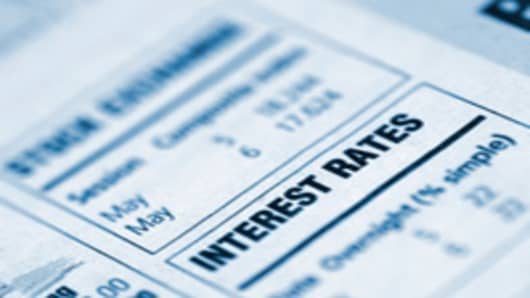Though the federal government's extraordinary steps to make interest rates low enough to pull reluctant homebuyers have been largely successful, some are now wondering whether it's become too much of a good thing.
"With the government now subsidizing risk by buying mortgage-backed securities and keeping rates low, buyers are almost demanding the lower rates," says Jesse Keenan, adjunct professor of housing law at the University of Miami.
But some analysts says a rise in rates could force some would-be home buyers off the fence—as has happened in the past.
"Higher rates will force people to buy," says David Dessner, director of sales at Guardhill Financial, a mortgage broker firm in Manhattan. "People will see current rates as historically low and see rising rates as a time to buy, thinking that rates will keep rising once they start up."
With rates so low in a battered economy, the only way for them to go may be up. A look at rates show how historically low they are. The average for a 30-year fixed is 5.18 percent, while the 15-year fixed 's is 4.63 percent. The 5/1 ARM is 4.21 percent.
"It's hard to imagine them going any lower," says Greg McBride, chief economist at Bankrate.
"I think people need to be worried about them going up," adds Mark Goldman, professor of real estate at San Diego State University.
In the past, the prospect of higher rates has typically led to a burst of mortgage activity, but in the current environment, particularly after the extenuating circumstances of the past two years, it's hard to say if that dynamic will play out again.
Higher rates (triggered by an apparent rebound in the economy) might drive some home buyers to sign on the dotted line, but they could also produce a marked slowdown in today's fragile housing market, say analysts.
"Higher rates put a damper on things," says Chuck Whitehead, a real estate broker with Coldwell Banker Associated Brokers in Temecula, California. "That works even for the seller. If rates go up then someone who qualifies for a loan now might not be able to with higher rates."
"Once you start increasing rates to that 6-percent mark, you take a big dent out of the market," adds Frank Nitschke, a principle at Maximus Advisors, a research group for CW Capital, a commercial real estate finance and investment management firm.
The traditional interest-rate dynamic may be different for other reasons as well this time. First- time buyers and foreclosure sales are accounting for an unusually high percentage of sales.
"They see very low prices and with the $8,000 tax credit for them about to expire (end of November) we've seen a 10 percent increase in unit sales the last six months," says David O'Neil, a broker, owner of Century 21 Spindler and O'Neil Associates in North Reading, Massachusetts.
There's been little move-up or trade-up business is many markets, especially the more expensive ones, partly because the credit applies to only first-time buyers.
"Low rates are not enough to keep the market going," says Cindy McClellan, a real estate broker in the Denver, Colorado area. "If the tax credit goes away and more jobs as well, low interest rates won't do much to help."
(The credit is set to expire Dec. 1, but there's growing speculation it will be extended or even expanded.)
"I think the market might soften," says Johnny Martinelli, broker/owner of LevyMart Real Estate Sales and Investments in Norman, Oklahoma. "The residential real estate market is starting to level out."
The slowdown may already be underway. Mortgage applications for purchases and refinancing fell on a week-to week basis in the period ending Sept. 25, despite the lowest lending rates in four months—4.81 percent for a 30 year—according to a Mortgage Bankers Association survey.. (Compared to a year ago—when the 30-year averaged 6.33 percent—applications were up some 44-percent.
Whether rates stay where they are now or move up, what happens to the housing market may turn out to be a case of psychology, says J. Andrew Hansz, director of the Gazarian Real Estate Center and professor at the Craig School of Business at Cal State University Fresno.
"Inflation and higher interest rates should encourage people to buy real estate sooner than later," says Hansz. "But real estate ownership is relatively out of favor now. In the bubble days, housing was an investment. But the sentiment has changed. Now it's a place to live. With jobs being cut, credit tight or tougher to get, consumers are not rushing into the market."
- Compare Mortgage Rates Nationwide



